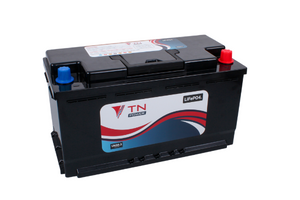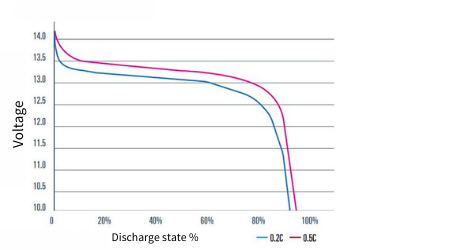| Upgrading to lithium batteriesLithium batteries are becoming more popular in the leisure market and many people are looking to upgrade to this more efficient technology. Unfortunately, simply upgrading the battery may not be enough and fundamental changes may need to be made to your 12V set-up. In this guide, we will walk you through the basics of lithium batteries and look at what you will need to make sure your set-up is suitable for this upgrade. What Is a Lithium Battery?
Lithium batteries contain Lithium-Iron Phosphate (LiFePO4) as their cathode, unlike lead-acid batteries that use a lead-dioxide. Unlike wet lead-acid there is also a non-liquid electrolyte in lithium batteries, meaning they are much safer to store and don't gas or require maintenance. What is LiFePO4?Lithium-Iron Phosphate (LiFePO4) is a natural mineral that was identified for use as a cathode in 1996 and since then has gained considerable acceptance in the market. Due to low electrical conductivity, many developments have been made to help increase its performance such as coating the particles in carbon nanotubes, reducing their size or coating in them lithium pyrophosphate. All these breakthroughs have increased the energy-storing potential of lithium batteries whilst reducing their weight and size. The technology is still in its infancy so further development will continue to increase their performance over time. Why is it better than other battery chemistries?Lithium is the lightest of all metals and has the highest electrochemical potential, which offers a much better power-to-weight ratio when compared with traditional wet-lead acid batteries and means that you can get more power from the same weight. Lithium is also more resilient for charging, being able to handle a far greater number of charge cycles & higher rates of charge with no damage being caused. Lithium batteries are able to be stored in a partial charge state, unlike lead-acid batteries, and do not suffer from long term damage. In fact, lithium batteries prefer to be stored in a semi-charged state as this extends their life expectancy. This is because if fully charged, all the electrons will be at the negative terminal leaving the positive depleted for long periods. This can cause damage due to instability and, for this reason, it is best practice when storing lithium batteries for long periods to have them sit at a 50% state of charge to help keep the electrons balanced. The following table shows some key performance characteristics of lithium vs lead-acid batteries:
Do I need a BMS?Having a Battery Management System (BMS) is extremely important with Lithium batteries. These systems will disconnect the charging/discharging sources from the battery in the event of a dangerous condition, e.g. over-voltage or internal failure, and they will monitor the voltage of the internal cells to make sure they remain balanced through the charging cycle, helping to prevent overcharging or undercharging. Unlike lead-acid batteries, lithium battery cells are not able to self balance during charging. Many lithium batteries come with a BMS integrated internally, whilst others come without a BMS and a separate, external one will need connecting. Either way, it is important that you understand your battery configuration to ensure your system has a BMS fitted to monitor and protect the battery. Will my mains charger work?Lithium batteries require a different charging profile to wet lead-acid batteries. A mains charger with only a lead-acid charge profile would partially recharge a lithium battery, however, it is extremely unlikely it would reach 100% as the voltage during the adsorption mode not be optimised for lithium charging. You would also find that the lithium battery would need to be depleted to around 20% overall capacity before the charger started its bulk stage charging again. This is because, when compared with lead-acid batteries, lithium batteries don't suffer such a significant nominal voltage drop-off as charge capacity decreases. So for an equivalent state of charge, a lithium battery has a much higher nominal voltage than a lead-acid battery. A battery charger set for lead-acid charging would equate this higher voltage to a higher state of charge and prevent bulk charging from starting. A battery charger with a dedicated lithium charge setting, however, would be programmed to commence bulk charging at a much higher nominal voltage. The following chart shows voltage drop off against discharge state
For this reason, before upgrading your battery, it is worth checking that your mains charger has a specific lithium setting to use or it may need to be upgraded alongside the battery. Charging at low temperatureLithium batteries are temperature sensitive so care needs to be taken so they are not charged at low temperatures. Charging lithium batteries at temperatures of between 0 to -20oC will cause lithium plating which is when the lithium ions fail to intercalate into the graphite anode and instead coat the anode in metallic lithium. BMS units will prevent the charge from going into the battery until the core temperature rises above the minimum level to help prevent this from happening. Lithium batteries do generate heat so if the battery is below temperature, drawing a load off the battery will allow the battery to warm up so it can accept a charge. Some lithium batteries have built-in heater units that will take current from any chargers attached to the battery (preventing the battery from being discharged) to warm the battery to a suitable temperature. Once the temperature is reached the heater will be switched off and the full charging output can be used to charge the battery. Will I be able to split the charge?Yes, however, you would not be able to use an older VSR (Voltage Sensitive Relay) system. This is because the relay merely allows the alternator's charge to be passed to the leisure battery, usually at a fixed voltage. This is fine for charging the starter battery of the vehicle but is not even optimised for lead-acid batteries, so is definitely not suitable for lithium batteries. The solution is to use a DC-DC charger which takes its power from the alternator and outputs a voltage profile for whatever battery type you select, including lithium. DC-DC chargers are needed for Euro 5/6 vehicles, regardless of the leisure battery chemistry (see our article here), so you may already have one with your existing lead-acid setup, but it's something to consider when thinking about upgrading to lithium. What about my Solar Controller?Most MPPT Controllers already have a lithium setting, however, we have found some folding solar panels don't and neither do some cheaper brands. It would pay to check if you already have one before buying the battery by either checking the settings on the controller or referring to the manual. If buying a new MPPT solar controller, we would recommend going for a well-respected brand name, as they will tend to cater for the newer battery chemistries such as lithium, or at least checking the controller specs with the retailer. What about the rest of my system?The rest of your electrical system should operate as normal once the new battery is installed so no need for a full re-wiring job. However, if you are unsure it is worth seeking the advice of an auto electrician to check the system over to make sure. We hope you have found this article helpful, however, if you do have any further questions please contact our sales team on 01844 885 100 or sales@12voltplanet.co.uk
Disclaimer - The information contained in these articles is provided in good faith and we do our best to ensure that it is accurate and up to date, however, we cannot be held responsible for any damage or loss arising from the use or mis-use of this information or from any errors or omissions. The installer is ultimately responsible for the safety of the system so if you are in any doubt, please consult a qualified electrician. |
12 Volt PlanetAuto & Marine Electrical Components |










